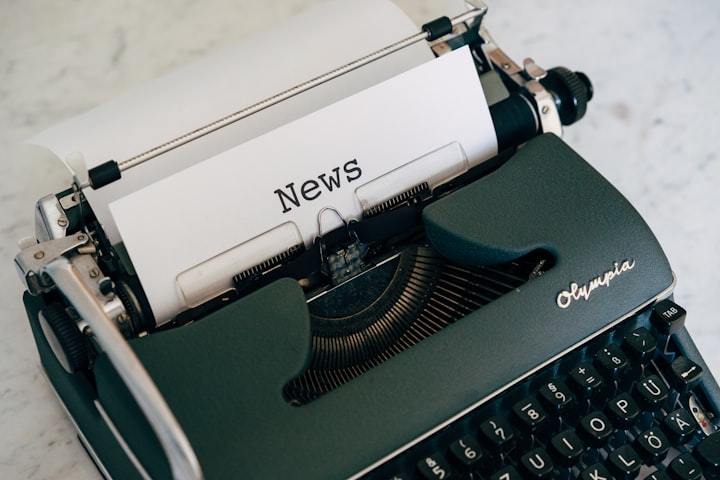When Writing about Disabilities
The words you choose can shape the way others see disabled people.

I'm a DeafBlind writer, when I'm not writing or researching my stories I like to read what others write about disabled people.
Some of the content I see is aggravating and ableist and continues to portray disabled people in a negative light with the words they choose to use.
Please note this is a personal opinion - living with a dual disability and chronic illness. There are others that have their own preferred label and identity.
Stop the Person First Language
This concept has existed for a long time - since the 80s' & 90s'. The Person First approach emphasizes using language that focuses on the person first rather than their condition or disability.
According to this approach, I should be addressed as "a woman with a hearing loss and is visually challenged".
*stares at watch waiting for them to finish*
What a mouthful. I'm DeafBlind - it's that simple. We need to change it to Identity First Language.
Identity first language places disability first and emphasizes that disability is an important part of a person's identity, not something that is separate and unimportant.
Identity-first language challenges the fear and avoidance of addressing disability that is often present in society. It validates the identity of disabled people and celebrates the diversity of human experience.
I cannot reduce my DeafBlindness to “medical conditions” only. Being DeafBlind is ingrained in every part of my life - how I do things every day, how I view life, how I think & react, and so on and on.
I live with it 24/7 and I'm just fine with that.
Negative Connotations
This one irks me so much. I see writers and journalists describing disabled people as:
These word choices imply that disability is a bad thing, a punishment or curse, and a burden.
We need to change the focus to acceptance. The majority of disabled people have accepted their identity and have many accomplishments and joy in their lives.
I once had a lady remark "You can't be disabled, you look happy".
We are living our lives to the fullest even though our "normal" is different from society's. It's time to change that.
Overblown Political Correctness
It's frustrating to see journalists come up with words to soften my disability.
Weird words like:
- Nonhearing
- Hearingless
- Hearing Challenged
- Handicapable
- Differently-Abled
- Diversely-Abled
Would you just stawwwwp!
It's Deaf, Hard of Hearing, or the generic term hearing loss. The term Hearing Impaired is offensive to many in the Deaf community. (Please note that some individuals may still use this term - respect their choice of labels).
Choosing words like Handicapable, Differently-Abled, or Diversely-Abled is an attempt to reframe disability as a positive by focusing on the "ABLE" part. This is a dismal failure as it still creates an "us vs. them" mentality that marginalizes disabled people.
Stop being Afraid
Having a disability isn't taboo, it's not shameful, harmful, or even contagious. (You should see how many people turn white as a ghost and back away slowly when they find out I'm DeafBlind).
Fear causes control.
You may believe that the practice of institutionalizing disabled people, keeping them hidden away from public view, and forcibly sterilizing them is a thing of the past. But sadly it's not - it's still happening.
A woman with Down Syndrome living in an institution was forced to be sterilized without her consent in 2010! Did you know that thirty-one states and Washington D.C. still have laws that allow forced sterilization today?
Society's need for control over things they fear or don't understand has a devastating impact on the lives of disabled people. It can make it difficult to find employment, housing, healthcare, transportation, communication - every aspect of their lives.
Using respectful words to describe disabled people the way we want to be described can help reduce this fear and promote understanding.
All You Need to Do is Ask
If you're going to write about a disability, please ask disabled people about positive word choices, the proper terminology, and learn their story. Interview several people, join their social media groups, and do your homework.
Even better yet - hire a disabled writer to do the story for you. There are sites out there like Disabled Writers and the Disability Visibility Project for a list of great writers.
I dream of a day when I can read positive stories about disabled people. A day when society sees disability as a difference, not a limitation.
About the Creator
Tracy Stine
Freelance Writer. ASL Teacher. Disability Advocate. Deafblind. Snarky.
Reader insights
Outstanding
Excellent work. Looking forward to reading more!
Top insights
Easy to read and follow
Well-structured & engaging content
Expert insights and opinions
Arguments were carefully researched and presented
Eye opening
Niche topic & fresh perspectives
Heartfelt and relatable
The story invoked strong personal emotions
On-point and relevant
Writing reflected the title & theme







Comments (12)
Love the story.As a disability advocate I agree with what you have said. Much appreciated.
I enjoyed this piece. I have four siblings who have disabilities and have heard many people say comments that are not on point. I appreciate this piece.
It was good to hear your perspective, which agrees and disagrees with folks I know who are blind or deaf. Important take-home... just ask. Well-done piece💙Anneliese
Tracy, this is so well-said and such an important read. Congrats on the TS!
I love your advice to simply ask questions. In my experience very few people are ever offended when you genuinely want to respect their preferences. And I agree about all the phrases designed to spin the reality of someone's situation. I am not disabled but I have had terminal cancer for almost 7 years now. There are some things commonly said about cancer patients that I just hate. Thank you for sharing your perspective with us.
I love your empowering and very beautiful message about representing people with disabilities in a way that showcases them as people and their strength!! Excellent job I love your voice
I enjoyed this Tracy and I will be posting soon about my experiences teaching disabled children and adults and, consequently, learning from them. I completely agree with your sentiments. I'm curious about the choice of the DeafBlind label, as it seems to have cultural connotations. I've been out of the loop for a long time, so please pardon my ignorance.
Great article, Tracy! And I agree with most of your points - however, I do disagree with labeling my disability as my identity - I am a woman with a disability (which seriously impacts my life every day) - I will not identify myself as a disabled woman, just as I will not define myself as any other label - I am also a mom, a wife, an equestrian, a writer, etc but first, I am a woman (which, I guess, is a label) who is also disabled, as well as a number of other things - I really do despise it when people refer to disabilities as "struggling with..." and the other terms you used - I applaud you for writing head-on about this issue! I also find it annoying how people try to refer to disabilities with a softer language - like we don't know what we have? I'm sorry it makes others uncomfortable - it shouldn't - and talking about it openly as you do here is a good start.
Excellent Article and Congratulations on Your Deserved Top Story🎉🎉🎉💯😉💖📝✨👌🎉🎉🎉🎉
Great article and very nuanced in nature. My only hang-up is the person-first vs. identity-first language. Perhaps this depends on the disability of the person because I know for me, personally, I prefer person-first language when talking about my own disabilities (bipolar disorder and adhd). I hope you don't find this comment critical because that was not my intent. I just wanted to bring my perspective into the conversation, so I hope that's alright. Thank you for writing this up! I think it will prove useful for people to read :)
Since God made all people, doesn't that make everyone a gift, and write ups should also express the same feeling? I agree with you. Read mine too? https://vocal.media/fiction/an-irrevocable-dream-about-a-mermaid
Agree with you adding able doesn't change things. It does create divisiveness I am deaf. I prefer to use the word amplification pieces instead if hearing aids. While I have a profound hearing loss and candidate for cochlear implants, I haven't selected that option. Admittedly, I do write that I am hearing impaired having no negatives with the words, but when people don't get it, I say that I am deaf. Excellent story, Tracy!!! ❤️❤️💕